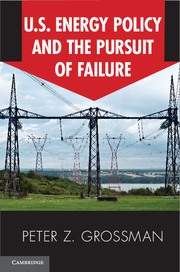Appendix - The “Do Something” Dilemma, a Decision Problem
Published online by Cambridge University Press: 05 March 2013
Summary
Definitions, Assumptions
Socioeconomic changes that lead to spikes in public attentiveness are termed “shocks.” In the case of energy, these spikes are due almost exclusively to large price increases, supply disruptions, or both. A shock may be short lived – a sudden jump in gasoline prices, for example. A shock also may be the result of a single precipitating event. The 1973 Arab oil embargo was an example of this type and its effects lasted for a few months. The acute nature of such shocks, it is argued, spurs a demand from the public for policy makers to “do something.”
Energy shocks may also be due to a series of events unfolding over weeks or months that lead to ever-building public attentiveness and growing salience. At some point, however, these events have produced impacts that become increasingly disruptive to constituents. The surging prices of oil along with periodic supply disruptions from early 1979 through early 1980 would be a case of this type. The “shock” is experienced at the point where prices have risen past some general level of comfort and where a continuation of soaring prices and/or constrained supply seems inevitable. This focuses attention and again leads to demands that political actors “do something.”
- Type
- Chapter
- Information
- US Energy Policy and the Pursuit of Failure , pp. 355 - 362Publisher: Cambridge University PressPrint publication year: 2013

